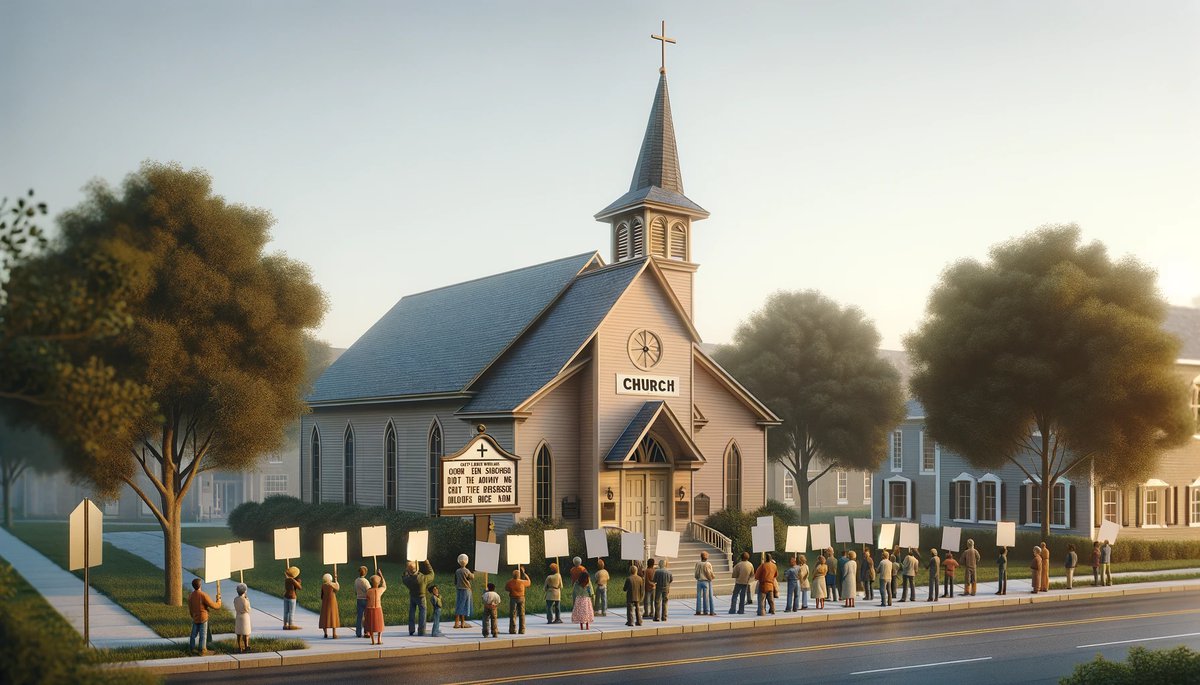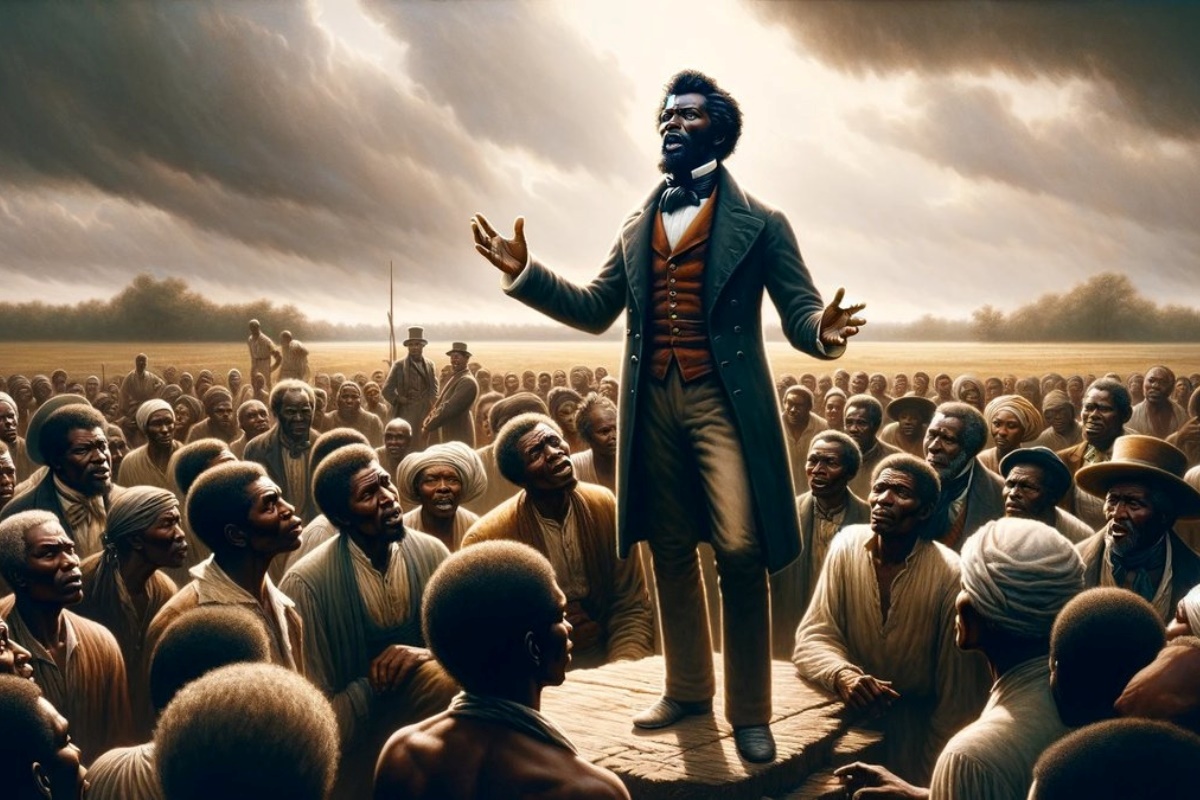Home>Theology and Spirituality>Why Did Beth Moore Leave The Baptist Church


Theology and Spirituality
Why Did Beth Moore Leave The Baptist Church
Published: February 21, 2024
Ericka Andersen, an editor at Christian.net, expertly merges digital strategy with content creation, focusing on faith and societal issues. Her communication skills enhance the platform's engaging narratives, fostering meaningful dialogue on belief's impact on society.
Discover why Beth Moore left the Baptist Church and explore the theological and spiritual implications of her decision. Gain insight into this significant shift in her faith journey.
(Many of the links in this article redirect to a specific reviewed product. Your purchase of these products through affiliate links helps to generate commission for Christian.net, at no extra cost. Learn more)
Table of Contents
Introduction
Beth Moore's departure from the Baptist Church has sparked widespread interest and raised thought-provoking questions within the religious community. As a prominent figure in evangelical circles, Beth Moore's decision to leave the Baptist Church has ignited discussions about faith, gender roles, and the evolving landscape of religious institutions. This pivotal moment has prompted a closer examination of the factors that led to her departure and the potential implications for both the Baptist Church and the broader evangelical movement.
The circumstances surrounding Beth Moore's exit from the Baptist Church have given rise to a deeper exploration of the intersection between theology, spirituality, and social dynamics. By delving into the details of her departure, we can gain valuable insights into the evolving perspectives on women's roles in religious leadership, the impact of cultural shifts on traditional denominations, and the complexities of navigating personal convictions within institutional frameworks.
Beth Moore's journey, marked by her influential teachings and unwavering commitment to faith, has resonated with countless individuals seeking spiritual guidance and empowerment. Her decision to part ways with the Baptist Church has prompted a reevaluation of the traditional structures and doctrines that have long defined evangelical Christianity. This pivotal moment invites us to consider the broader implications for religious communities and the ongoing dialogue surrounding inclusivity, doctrinal interpretation, and the evolving role of women in ministry.
As we delve into the intricacies of Beth Moore's departure from the Baptist Church, it becomes evident that this significant event transcends individual circumstances, offering a compelling lens through which to examine the evolving landscape of faith, theology, and institutional dynamics. By exploring the underlying reasons for her departure and the subsequent responses from both within and outside the Baptist Church, we can gain a deeper understanding of the multifaceted implications of this pivotal moment in the evangelical sphere.
Read more: Why Did George Wright Leave Shandon Baptist
Beth Moore's Background in the Baptist Church
Beth Moore's deep-rooted connection to the Baptist Church has been a defining aspect of her spiritual journey and ministerial endeavors. Raised in a devout Southern Baptist family, Moore's formative years were steeped in the rich traditions and teachings of the Baptist faith. Her early exposure to the scriptures and the evangelical ethos within the Baptist community laid the groundwork for her future vocation as a prominent Bible teacher and author.
From a young age, Moore exhibited a profound passion for studying and interpreting the Bible, a fervor that would later propel her into the realm of evangelical ministry. Her unwavering commitment to the Baptist Church was evident as she actively participated in various church activities, embracing the teachings and values espoused by the denomination.
As Moore's spiritual journey unfolded, her involvement in the Baptist Church deepened, leading her to embark on a path of ministry that would ultimately shape her identity as a prominent evangelical figure. Her immersion in the Baptist tradition not only nurtured her theological acumen but also instilled within her a profound reverence for the scriptures and a dedication to sharing the gospel with unwavering conviction.
Throughout her tenure within the Baptist Church, Moore's influence extended far beyond the confines of her local congregation, as her dynamic teaching style and insightful biblical exegesis garnered widespread acclaim within evangelical circles. Her unwavering commitment to the Baptist faith and her profound impact as a Bible teacher solidified her position as a revered figure within the denomination.
Moore's profound connection to the Baptist Church, characterized by her unwavering dedication to biblical teachings and evangelical ministry, served as the cornerstone of her spiritual identity and ministerial endeavors. Her formative years within the Baptist tradition laid the groundwork for her transformative impact as a prominent Bible teacher and author, shaping the trajectory of her influential career within the evangelical sphere.
As we delve into the intricacies of Beth Moore's background in the Baptist Church, it becomes evident that her formative experiences within the denomination profoundly influenced her theological perspective and ministerial approach, laying the groundwork for her enduring impact as a prominent evangelical figure.
Reasons for Beth Moore's Departure
Beth Moore's departure from the Baptist Church can be attributed to a confluence of factors that reflect the evolving dynamics within evangelical Christianity. One significant catalyst for her decision was the growing tension surrounding the role of women in ministry within the conservative theological framework of the Southern Baptist Convention, the largest Baptist denomination in the United States. Moore, known for her influential teachings and unwavering commitment to biblical principles, found herself increasingly at odds with certain doctrinal stances and institutional attitudes that constrained the full expression of her calling as a female leader within the church.
The issue of gender equality and women's leadership roles has been a point of contention within many conservative Christian denominations, including the Southern Baptist Convention. As Moore's influence and platform expanded, she became a vocal advocate for elevating the voices and contributions of women in church leadership, challenging traditional interpretations of biblical passages often used to restrict women from holding certain positions of authority within the church. This advocacy for a more inclusive approach to women's ministry placed her in a complex position within the hierarchical structures of the Southern Baptist Convention, where traditional gender roles and theological interpretations remained deeply entrenched.
Furthermore, Moore's departure can be seen as a response to the broader cultural and societal shifts that have prompted introspection within religious institutions. The increasing emphasis on issues such as gender equality, social justice, and inclusivity has compelled many within the evangelical community to reevaluate traditional stances on various theological and social matters. As a prominent voice within evangelicalism, Moore's decision to part ways with the Baptist Church reflects a broader realignment of priorities and convictions in light of the evolving cultural landscape.
Additionally, personal spiritual discernment played a pivotal role in Moore's departure. As she navigated the complexities of her own faith journey and ministerial calling, she grappled with the tension between remaining faithful to her convictions and operating within the confines of an institutional framework that seemed increasingly incongruent with her evolving theological and social perspectives. This internal struggle ultimately led her to make the difficult decision to step away from the Baptist Church, seeking a more expansive platform to fulfill her calling while remaining true to her deeply held beliefs.
Beth Moore's departure from the Baptist Church underscores the intricate interplay of theological, cultural, and personal factors that can precipitate significant shifts within religious institutions. Her decision serves as a poignant reminder of the ongoing dialogue surrounding gender, theology, and institutional dynamics within the evangelical landscape, prompting introspection and dialogue within the broader religious community.
Impact of Beth Moore's Departure
Beth Moore's departure from the Baptist Church has reverberated across evangelical circles, sparking profound reflections on the evolving dynamics of faith, gender, and institutional paradigms. The repercussions of her decision extend far beyond the confines of the Baptist denomination, permeating the broader evangelical landscape and prompting a multifaceted impact on theological discourse, institutional structures, and the lived experiences of countless individuals within the faith community.
One notable impact of Moore's departure lies in the reconfiguration of traditional gender dynamics within evangelicalism. As a prominent advocate for women in ministry, her decision to part ways with the Baptist Church has underscored the complexities of navigating gender roles and theological interpretations within conservative denominational frameworks. This pivotal moment has prompted a deeper examination of the barriers and opportunities for women in leadership roles within evangelical institutions, igniting conversations about inclusivity, representation, and the theological underpinnings of gender equality in ministry.
Furthermore, Moore's departure has catalyzed introspection within the Southern Baptist Convention and similar conservative denominations, compelling leaders and congregants to grapple with the implications of her exit. The void left by her absence within the Baptist Church has prompted a reassessment of the denomination's approach to engaging with diverse theological perspectives and responding to the evolving societal discourse on issues such as gender, justice, and inclusivity. This introspective process has the potential to shape the future trajectory of the denomination and its stance on critical theological and social matters.
On a broader scale, Moore's departure has served as a catalyst for broader conversations within evangelicalism about the intersection of faith, culture, and institutional structures. Her decision has prompted individuals and communities to confront the complexities of remaining faithful to deeply held convictions while navigating the evolving cultural landscape. This introspective dialogue has the potential to foster a more nuanced understanding of the diverse perspectives and experiences within the evangelical community, ultimately contributing to a more inclusive and empathetic approach to theological discourse and institutional dynamics.
In essence, Beth Moore's departure from the Baptist Church has left an indelible imprint on the evangelical landscape, catalyzing transformative conversations about gender, theology, and institutional paradigms. Her decision has prompted a reevaluation of traditional frameworks and has the potential to shape the trajectory of evangelical institutions, theological discourse, and the lived experiences of individuals navigating faith within a complex and evolving world.
Response from the Baptist Church
The response from the Baptist Church to Beth Moore's departure has been characterized by a complex interplay of introspection, dialogue, and reaffirmation of doctrinal convictions. Within the Southern Baptist Convention, the largest Baptist denomination in the United States, Moore's decision to leave has prompted a multifaceted response that reflects the diverse perspectives and theological underpinnings within the denomination.
At the forefront of the response is a deep sense of introspection, as leaders and congregants grapple with the implications of Moore's departure. The decision has prompted soul-searching within the denomination, compelling individuals to reexamine the theological and cultural dynamics that have shaped the institution's approach to issues such as gender roles, ministry, and doctrinal interpretation. This introspective process has engendered candid conversations about the evolving landscape of evangelicalism and the imperative of engaging with diverse perspectives within the faith community.
Simultaneously, the response from the Baptist Church has been marked by a reaffirmation of doctrinal convictions, particularly concerning traditional interpretations of gender roles and theological principles. Within conservative denominational frameworks, the departure of a prominent figure like Beth Moore has prompted a reiteration of foundational beliefs and theological stances, reflecting a commitment to upholding doctrinal integrity amidst shifting cultural tides. This reaffirmation underscores the deeply entrenched theological convictions that continue to shape the identity and trajectory of the Baptist Church.
Moreover, the response from the Baptist Church has sparked dialogue about the complexities of navigating theological diversity within the denomination. Moore's departure has prompted conversations about the need to engage with differing perspectives on issues such as women's roles in ministry, doctrinal interpretation, and the evolving societal discourse. This dialogue reflects a recognition of the diverse theological currents within the Baptist community and the imperative of fostering a spirit of understanding and empathy amidst theological differences.
In essence, the response from the Baptist Church to Beth Moore's departure encapsulates a nuanced interplay of introspection, reaffirmation of doctrinal convictions, and dialogue about theological diversity. This multifaceted response underscores the complexities of navigating theological and cultural shifts within the denomination, offering a compelling lens through which to examine the evolving dynamics of faith, institutional paradigms, and the ongoing dialogue within evangelicalism.
Conclusion
Beth Moore's departure from the Baptist Church stands as a poignant testament to the intricate interplay of theology, gender dynamics, and institutional paradigms within evangelical Christianity. Her influential presence and unwavering commitment to biblical teachings have left an indelible mark on the evangelical landscape, prompting transformative conversations about the evolving role of women in ministry, the complexities of navigating theological diversity, and the imperative of engaging with shifting cultural dynamics within religious institutions.
As Moore embarks on a new chapter outside the confines of the Baptist Church, her departure serves as a catalyst for introspection and dialogue within the broader evangelical community. It prompts a reevaluation of traditional gender roles and theological interpretations, igniting conversations about inclusivity, representation, and the theological underpinnings of gender equality in ministry. Her decision has also compelled individuals and communities to confront the complexities of remaining faithful to deeply held convictions while navigating the evolving cultural landscape, fostering a more nuanced understanding of the diverse perspectives and experiences within the evangelical community.
Furthermore, the response from the Baptist Church reflects the diverse perspectives and theological underpinnings within the denomination, encompassing introspection, reaffirmation of doctrinal convictions, and dialogue about theological diversity. This multifaceted response underscores the complexities of navigating theological and cultural shifts within the denomination, offering a compelling lens through which to examine the evolving dynamics of faith, institutional paradigms, and the ongoing dialogue within evangelicalism.
In essence, Beth Moore's departure from the Baptist Church has sparked profound reflections on the evolving dynamics of faith, gender, and institutional paradigms. It has prompted transformative conversations about the intersection of theology, culture, and institutional structures, ultimately contributing to a more inclusive and empathetic approach to theological discourse and institutional dynamics within the evangelical landscape. As the reverberations of her departure continue to unfold, the evangelical community is poised to navigate a landscape marked by introspection, dialogue, and a renewed commitment to engaging with the complexities of faith in a rapidly changing world.














